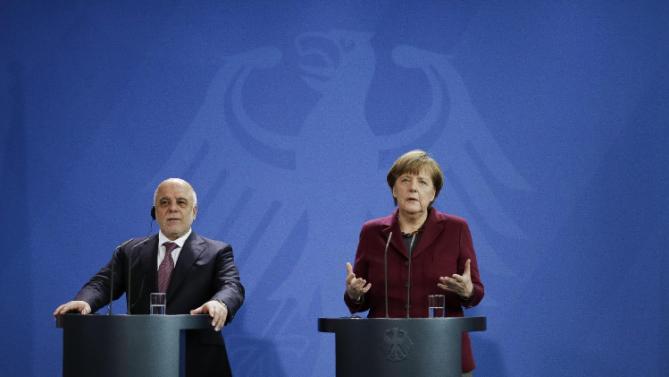
German Chancellor Angela Merkel, right, and Iraqi Prime Minister Haider al-Abadi, left, attend a joint press conference at the chancellery in Berlin, Thursday, Feb. 11, 2016. (AP Photo/Markus Schreiber)
Germany will give a 566- million-dollar loan (500 million Euros) credit to Iraq to help it withstand the sharp downturn in global oil prices, Chancellor Angela Merkel said on Thursday after meeting with Iraqi Prime Minister Haider al-Abadi in Berlin.
“Germany is ready to do what it can … to stabilize Iraq in view of the big security challenges and economic challenges,” Merkel told a joint news conference with Abadi, stating the influence of weak oil prices on the Iraqi state budget.
Merkel also stated Germany’s willingness to help with the demining of cities and towns in Iraq so the country’s internal and external refugees “don’t have to leave their country.”
The German chancellor is seeking a solution to Europe’s migrant crisis, which has seen some 1.1 million people, including tens of thousands of Iraqis, arrive in Germany over the past year fleeing violence, wars and poverty.
Iraq is one of the main sources of refugees heading to Germany and the government is working on shrinking the number of asylum-seekers coming here.
The chancellor also stressed Iraq’s need to restore its war-shattered infrastructure to give its citizens hope and to encourage them to remain in the country.
In addition to the fall in oil prices, Iraq is also battling ISIS militants who control strips of territory in the north and west.
The long-ravaging war has left Iraq struggling to pay its bills, after it previously used to derive its income almost entirely from oil sales. The 2016 budget projects a 24 trillion Iraqi dinar ($20.45 billion) deficit financed largely by aid from international organizations such as the World Bank.
Baghdad is estimated to need hundreds of millions of dollars to repair infrastructure in cities taken back from ISIS with the support of airstrikes from the U.S.-led coalition, of which Germany is also a member. ($1 = 0.8837 euros) ($1 = 1,173.8000 Iraqi dinars)
